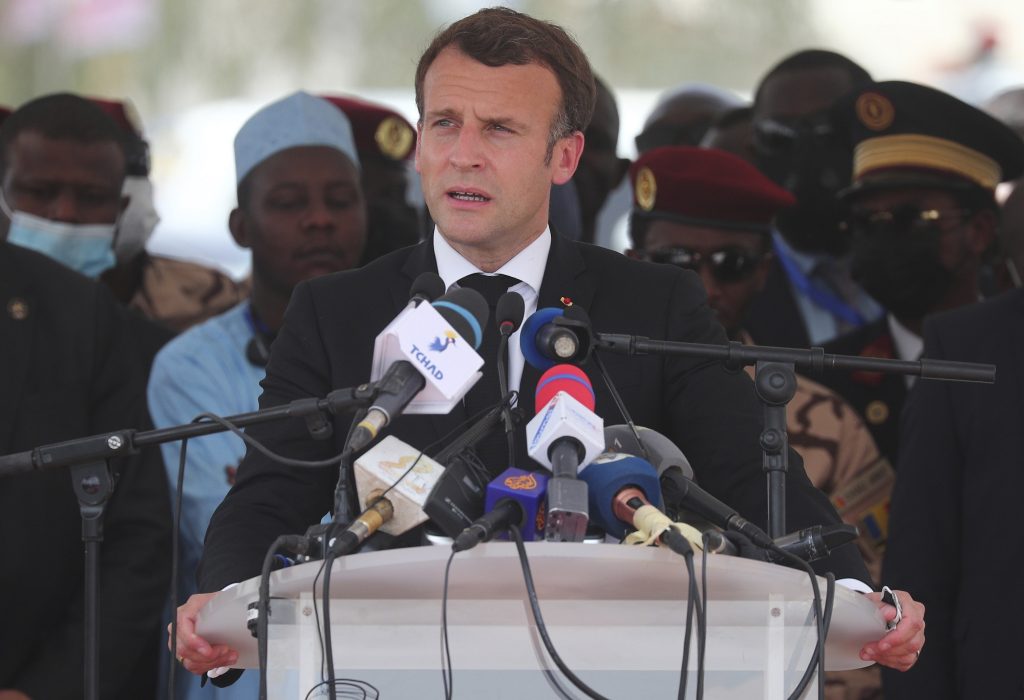News Online World News
by Stuart Williams & Joseph Schmid
French President Emmanuel Macron leads far-right leader Marine Le Pen in the first round of France’s elections Sunday by a larger than expected margin, with the rivals now set to battle for the presidency in a run-off later this month, projections showed. News Online
Macron scored 28.1-29.7 percent in the first round and Le Pen 23.3-24.7, with the top two candidates going through to the second round run off on April 24, according to projections by polling firms for French television channels based on a sample of votes.
The performance by Macron appears to be stronger than predicted by opinion polls in the run-up to the vote.
Far-left candidate Jean-Luc Melenchon was predicted to come third with 19.8-20.8 percent and extreme-right pundit Eric Zemmour on 6.8-7 percent with candidates of the traditional left and right trailing far behind.
Valerie Pecresse from the right-wing Republicans was on 4.3-5 percent, in a disastrous performance by the party of ex-president Nicolas Sarkozy, the projections showed.
Socialist Party candidate Anne Hidalgo was projected to face electoral doom with a score of just 1.8-2.0 percent.
The final-round duel between Macron and Le Pen is however set to be far tighter than the run-off between them in 2017, when the current president thrashed Le Pen with 66 percent of the vote.
Some 48.7 million voters were eligible to vote in the election after an unusual campaign overshadowed by Russia’s invasion of Ukraine.
The projections are compiled by polling companies based on a sample of votes from polling stations especially chosen from across the country. They have generally proved to be highly accurate in past elections.
News Online World News
Although her opponents accuse her of being an extremist bent on dividing society, Le Pen has with some success sought to show a more moderate image and concern with voters’ daily worries such as rising prices.

Macron by contrast campaigned relatively little, by his own admission entering the election campaign later than he would have wished due to the war in Ukraine.
- Pivotal debate –
A pivotal moment in the next stage of the campaign is likely to come on April 20 when the two candidates are set to take part in a TV debate broadcast live on national television.
The final debate has in the past had a crucial impact on the outcome of the vote such as in 2017 when Macron was seen as gaining the upper hand in exchanges with a flustered Le Pen.
World News News Online
Macron is expected for the next two weeks to put his diplomatic efforts on the Ukraine crisis to one side and focus more whole-heartedly on campaigning in a bid to find the election momentum that has so far eluded his team.
This marks the third time that a far right candidate has made the run-off vote of a French presidential election, after Marine Le Pen’s campaign in 2017 and the breakthrough by her father Jean-Marie in 2002 that shocked France, although he was ultimately defeated by Jacques Chirac.
According to the interior ministry, participation stood at 65 percent at 1500 GMT with three hours of voting left, down 4.4 percentage points from the figure at the same point in 2017.
Pollsters forecast that final turnout would be also be down sharply on 2017, though likely above the record-low turnout of just under 73 percent in the first round in 2002.
- High stakes –
The stakes are high for Macron, who came to power aged 39 as France’s youngest president with a pledge to shake up the country.
He would be the first French president to win a second term since Jacques Chirac in 2002.
If he does, he would have five more years to push through reforms that would include raising the pension age to 65 from 62, in defiance of union resistance.
He would also seek to consolidate his number-one position among European leaders after the departure of German chancellor Angela Merkel.
A Le Pen victory would be seen as a triumph for right-wing populism, adding to election victories last weekend by Hungarian premier Viktor Orban and Serbian leader Aleksandar Vucic, who both have cordial ties with Russian President Vladimir Putin.
Far-right former TV pundit Zemmour made a stunning entry into the campaign last year but lost ground, and analysts say he has actually aided Le Pen by making her appear more moderate.
bur-jh-adp-js-sjw/jj
© Agence France-Presse. All rights are reserved.
World News News Online

